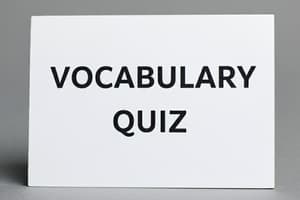Podcast
Questions and Answers
Match the following Basic English words with their Advanced English equivalents:
Match the following Basic English words with their Advanced English equivalents:
Help = Assist Build = Create Start = Initiate Finish = Complete
Flashcards
Commence
Commence
To begin or start something.
Assist
Assist
To provide support or aid to someone.
Construct
Construct
To make something, often using materials.
Conclude
Conclude
Signup and view all the flashcards
Purchase
Purchase
Signup and view all the flashcards
Signup and view all the flashcards
Study Notes
Basic vs. Advanced English Vocabulary
-
Help/Assist: Basic "help" is a more general word, while "assist" suggests more specific or formal aid.
-
Build/Construct: "Construct" denotes a more deliberate or complex building process compared to the simpler "build."
-
Start/Initiate: "Initiate" implies starting something formally or with greater intentionality than the basic "start."
-
Finish/Conclude: "Conclude" suggests bringing something to a formal or decisive end, whereas "finish" is more general.
-
Buy/Purchase: "Purchase" is a more formal equivalent to "buy."
-
Say sorry/Apologize: "Apologize" suggests acknowledging fault and expressing regret, more extensively than a simple "say sorry."
-
Begin/Commence: "Commence" is a more formal way to say "begin."
-
Cheap/Inexpensive: "Inexpensive" suggests a lower price than the more general "cheap."
-
Scared/Terrified: "Terrified" represents a much stronger emotion of fear than "scared."
-
Rich/Wealthy: "Wealthy" implies greater financial affluence than the simple "rich."
-
Poor/Impoverished: "Impoverished" denotes a more severe state of poverty compared to the general "poor."
-
Big/Massive: "Massive" implies a much larger size or scale than the simple "big."
-
Small/Petite: "Petite" implies a small and graceful size, whereas "small" is more general.
-
Fast/Swift: "Swift" indicates a speed that is quicker or more rapid than the general "fast."
-
Slow/Leisurely: "Leisurely" suggests a slower pace for relaxation, contrast to the more general negative connotation "slow."
Studying That Suits You
Use AI to generate personalized quizzes and flashcards to suit your learning preferences.





